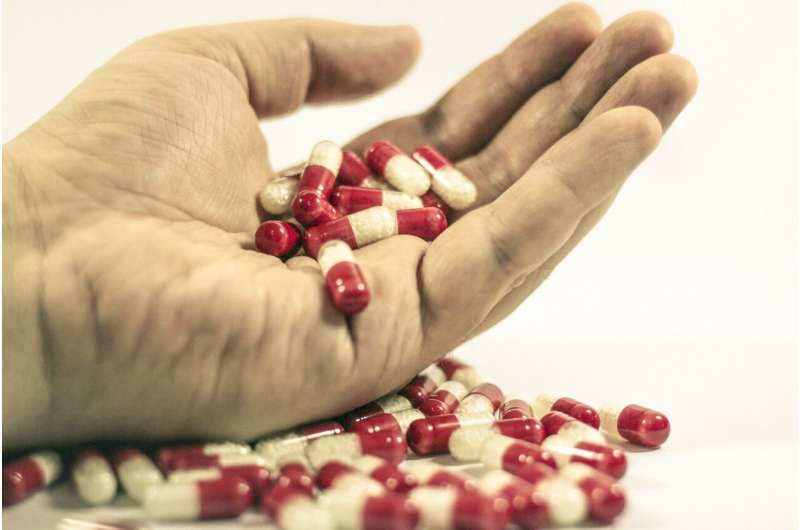This article has been reviewed according to Science X's editorial process and policies. Editors have highlighted the following attributes while ensuring the content's credibility:
fact-checked
trusted source
written by researcher(s)
proofread
Six surprising things about placebos everyone should know

Placebos have been studied more than any treatment in the history of medicine, yet they remain mysterious.
I've been studying placebos for 20 years and I've done some of the key studies that have advanced the scientific knowledge in this area. Here are six facts about this strange effect that still fascinate me.
1. Placebos have a dark cousin: Nocebos
A 29-year-old builder went to the hospital after having jumped onto a 15cm nail that pierced his boot. Moving the nail was so painful he had to be sedated with powerful drugs (fentanyl and midazolam) to remove it. But when he took off his boot, the medics discovered that the nail had gone between his toes. The builder's pain was caused by the wrong belief that the nail had penetrated his foot.
The detrimental effects of negative expectations are called nocebo effects. For evolutionary reasons (survival depends on avoiding danger), nocebo effects are larger than placebo effects.
Unfortunately, patients are often told more about the bad things that might happen than the good things, which can result in a self-fulfilling prophecy. For example, learning that a drug has a possible side-effect of nausea or pain can actually cause nausea or pain.
2. Placebos work even if people know they are placebos
Linda Buonanno suffered so badly from irritable bowel syndrome that she often couldn't leave the house for weeks. She signed up for a trial of "honest" (open-label) placebos, which is a placebo that patients know is a placebo.
The Harvard doctors in the trial told her the pills were "placebo pills made of an inert substance, like sugar pills, that have been shown in clinical studies to produce significant improvement in [irritable bowel] symptoms through mind-body self-healing processes."
The honest placebos worked so well that she was able to resume a normal life.
Honest placebos have worked in other trials for treating depression, back pain and attention deficit hyperactivity disorder (ADHD).
Honest placebos work because of our subconscious expectations. Our past experiences of doctors and hospitals can generate subconscious expectations that activate our body's inner pharmacy, which produces morphine (endorphins) and other beneficial drugs.
3. Honest placebos are ethically acceptable
It is often considered unethical for doctors to give placebos to patients because this supposedly involves lying (telling patients that a sugar pill is a powerful medication). But honest placebos do not involve lying, so there is no ethical barrier.
In one ongoing trial, doctors asked patients whether they would be willing to try a mix of real painkillers and honest placebos. Patients in this trial have the same level of pain relief following surgery, but are less likely to become dependent on painkillers.
4. Placebo effects are part of most treatment effects
When a doctor prescribes ibuprofen for back pain, the effects are due to the ibuprofen and the patient's beliefs and expectations, which can be influenced by the doctor's communication. Doctors who offer positive messages in a warm, empathic manner will increase the effect of the drugs.
The size and color of the pill can also influence the effect. A large, orange pill can reduce pain more than a small, red one.
By contrast, blue pills generally have a sedative effect—except for Italian men, for whom blue pills have an excitative effect), probably because their revered football team wears blue.
Doctors' ethical duty to benefit patients suggests it is an ethical duty to maximize the placebo effects of all treatments they provide.
5. You don't need placebos to have placebo effects
In one trial, patients were given morphine via an intravenous line following surgery. However, only half of the patients were told they were receiving morphine. The patients who were told this had 50% more pain relief than those who were not told they were receiving morphine. This is an example of a placebo effect without a placebo.
6. You can generate placebo (and nocebo) effects in yourself
All communication can have a beneficial or harmful effect. One study found that teaching communication skills to families reduced anxiety and depression. On the other hand, couples who dwell on problems and negative aspects of their relationships were shown in a study to have weaker immune systems.
Acts of altruism, focusing on a brighter future, or gratitude are proven ways to reduce the effect of negative communication. An easy way to generate positive placebo effects for yourself is by performing a random act of kindness, such as making a colleague a cup of tea, or simply smiling and saying hello.
You can learn more about the amazing effects of placebos and nocebos in my latest book, The Power of Placebos: How the Science of Placebos and Nocebos can Improve Health Care.
This article is republished from The Conversation under a Creative Commons license. Read the original article.![]()




















